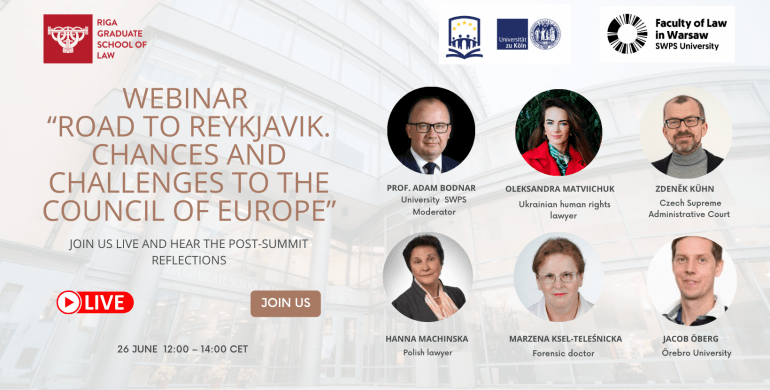The Road to Reykjavik: Post Summit Reflections

– June 26, 2023, Riga, Latvia
Oleksandra Matviichuk head of the Center for Civil Liberties participated in a panel discussion reviewing the Reykjavik Summit.
This joint webinar hosted by the Riga Graduate School of Law, SWPS University, and the University of Cologne aims to foster international cooperation and address the most vital issues concerning the crisis of human rights protection in Europe.
Context:
The 4th Summit of the Heads of State and Government of the Council of Europe which took place on May 16-17, 2023, in Reykjavik, Iceland, marking the first such meeting in 18 years. It provides a unique opportunity to discuss urgent issues such as the Russian aggression on Ukraine, the crisis of multilateralism, democratic backsliding, and emerging social problems. Although there are easy solutions to these challenges, dialogue is essential to mitigate their consequences.
Organizers invited lawyers, activists and thinkers to reflect on the future functioning of the Council of Europe as well as the reality the organization is facing as a result of the summit.
Oleksandra Matviichuk was delighted to see that the Reykjavik documents have a special focus on accountability.
Previously, Russia has never been punished for horrible war crimes across borders. As a result, their officials now believe they can do whatever they want. The present conflict is a full-fledged war between authoritarianism and democracy – not just Russia and Ukraine.
Putin is trying to convince the world that human rights are meaningless, directly challenging the basis for the Council of Europe.
There’s an accountability gap in Ukraine: no international court that can punish Russians for what’s happening. The national system, however, has opened 92,000 cases – totally overloaded. So we need to develop a system of collaboration between national and international investigators.
We also need to create a registry of damages. Rebuilding isn’t just about infrastructure; people have to be at the center of the rebuilding process. We need compensation, psychological support, ecological studies, business support, and other mechanisms to return civilians to war-torn areas. The registry would help us recognize the victims and get the truth out there.
Lastly, Ukraine needs to strengthen its democracy, including by moving closer toward admission to the EU.
These are difficult tasks: these reforms would be difficult during peacetime, let alone in a time of war – Oleksandra Matviichuk emphasized.
Follow the discussion recording.
Discussants:
Oleksandra Matviichuk is a Ukrainian human rights lawyer and civil society leader based in Kyiv. Oleksandra Matviichuk attended the Taras Shevchenko National University of Kyiv, graduating in 2007 when she was conferred a LL.M. In 2017, she became the first woman to participate in the Ukrainian Emerging Leaders Program of Stanford University.
She heads the non-profit organization Centre for Civil Liberties. In 2007, Oleksandra Matviichuk was awarded the Vasyl Stus Prize, In 2015, Matviichuk became a laureate of the Norwegian ‘Lindebrække Prize for democracy and human rights’. On 24 February 2016, 16 delegations to the OSCE recognized Matviychuk with their first Democracy Defender Award. The Centre for Civil Liberties was awarded the 2022 Nobel Peace Prize, jointly with Ales Bialiatski and the Russian organization Memorial. This was the first Nobel Prize awarded to a Ukrainian citizen or organization.
Zdeněk Kühn is a judge of the Czech Supreme Administrative Court (Brno) and a professor at the Department of Theory of Law at the Faculty of Law of Charles University in Prague. He also works at New York University in Prague. He lectures at several universities abroad (USA, Hungary, Croatia, Great Britain, etc.). He is one of the most intellectually influential Czech lawyers.
Hanna Machinska is a Polish lawyer and academic teacher; with a PhD in law. Director of the Council of Europe Office in Warsaw from 1991 to 2017, Deputy Ombudsman from 2017 to 2022. In 1973 she graduated in law from the Faculty of Law and Administration of the University of Warsaw. In 1978, she received her doctoral law degree. She did her internships at the European Commission, the Institute of Comparative Law in Lausanne, and at the universities of Maastricht, Aarhus and Florence. She was also an expert at the Office of the Committee for European Integration, a member of the Council for European Education of the Minister of Education, an expert on the Advisory Committee on European Law of the Minister of Justice and a member of the Advisory Legal Committee of the Minister of Foreign Affairs. In September 2017, she was appointed as Deputy Ombudsman. She served in this capacity until December 2022.
Background Note:
SWPS University is a leading private and research-oriented university in Warsaw, Poland with branch campuses in Sopot, Wroclaw, Katowice, Poznan, Krakow.
Riga Graduate School of Law (RGSL) is a top-tier law school in the Baltic region. Bachelor & Masters studies.
The University of Cologne is one of the most prestigious and research-intensive universities in Germany.

